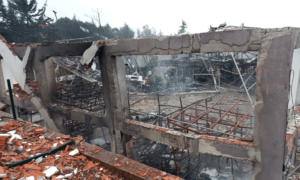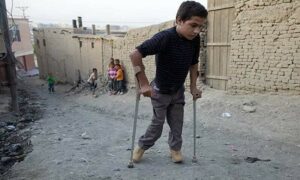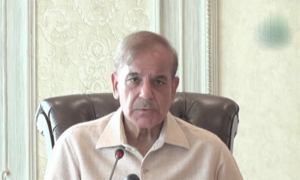In a land where enforced disappearances are buried in silence, women have found their voice through digital defiance.
“In the age of digital platforms, the voice of those whose loved ones have been forcibly disappeared can no longer be silenced,” said Hina Jilani, a human rights lawyer and activist. “These platforms have become the last bastion of hope and justice in a country where the rule of law is often subverted.”
The fight to end enforced disappearances has taken a transformative turn in Pakistan in recent years. Once relegated to the margins of visibility, female relatives of the forcibly disappeared have cultivated a powerful ally out of social media. Through digital advocacy, these women, often in their teens, have carved out a space where their demands for answers and accountability can no longer be ignored.
As the government intensifies its crackdown on digital spaces, they maintain their resolve: “We will continue to raise our voices irrespective of the risks,” said Sadaf Ameer, activist and daughter of forcibly disappeared, Ameer Baloch. “We will face the challenges but we will no longer be silenced.”
On August 30, the world marked the International Day for Victims of Enforced Disappearances. Like years past, hundreds of Pakistanis came together to mark the day, but this time, awareness of enforced disappearances was far more widespread than ever, with the hashtag #endenforceddisappearances echoing alongside physical demonstrations in Balochistan, Khyber Pakhtunkhwa, Punjab, and Sindh. This awareness continues to grow, in no small part, due to advocacy for the ‘forgotten victims’ of enforced disappearances by the families left behind.
Justice sought, justice denied
“Imran Khan used to attend Amina’s protests against enforced disappearances,” Shireen Mazari recalled. On another occasion, so did Nawaz Sharif. But 19 years have passed, and Amina and Aishah still don’t have any answers.
For enforced disappearances, the struggle to be heard has always been an uphill battle. Families of the disappeared, like those of poet and journalist Mudassar Naaru, have faced countless delays and obstructions in their plight for answers. As his father, Rana Mahmood Ikram, lamented during a protest marking six years of Naaru’s disappearance, cases of enforced disappearances languish in courts for years.
“If Mudassar has committed a crime, an FIR should be registered against him, and he should be presented in court,” pleaded Ikram. His frustration echoes a wider sentiment; at the very least, registering a first information report would require the state to acknowledge the existence of the disappeared.
Bus Khatoon, the mother of forcibly disappeared Rasheed Baloch, agreed, lamenting that “even foreign spies are afforded the right to meet their families”, but the families of Pakistan’s own citizens are left in the dark, the fate of their loved ones unknown.
What’s even more troubling is the fact that despite the prevalence of the practice, Pakistan has yet to criminalise enforced disappearances. On August 26, 2024, the United Nations yet again urged Pakistan to ratify the International Convention for the Protection of All Persons from Enforced Disappearance — a crucial step toward accountability. The absence of specific legislation on enforced disappearances allows perpetrators to evade justice. They can simply deny any involvement and claim ignorance about the missing person’s whereabouts, effectively erasing the existence of a disappeared loved one from official records — and from the lives of those who desperately seek their return.
This is not to say that there has been no effort to curtail the practice through legislation. Former human rights minister Shireen Mazari said their government’s manifesto “specifically called for an end to this practice and the first action I took as human rights minister was to draft a law”. According to Mazari, it took over two years to table the law due to “all manner of hindrances, especially a lack of interest from opposition parties”. Ultimately, the bill to end enforced disappearances, literally, disappeared.
When it finally surfaced several months later, after the Supreme Court inquired into the matter, the Senate Secretariat claimed it had never gone missing in the first place and had been sent back to the National Assembly.
When the malaise of enforced disappearances was again brought to the top court earlier this year, Chief Justice of Pakistan Qazi Faez Isa had hinted at resolving the issue “once and for all”, while at the same time insisting that the matter could only be settled if all accepted responsibility.
The apex court had also directed the Commission on Inquiry on Enforced Disappearances to submit a “comprehensive report” on missing persons. The report had subsequently revealed that the highest number of disappearances were reported from KP and Balochistan.
It also claimed that some missing persons may have been killed in drone attacks or migrated without informing families.
A new generation of activists
The generation of well-known female activists on digital platforms today were raised in the camps of Mama Qadeer and Amina Masood Janjua. Sammi Deen Baloch, daughter of Dr Deen Muhammad — abducted by plain-clothed armed men in 2009 — attended her first protest when she was nine years old, walked 2,000 kilometers in a historic long march at 14 years of age, which is also when she went on a hunger strike in front of the Quetta and Karachi press clubs.
“I observed journalists and reporters in front of press clubs, their big cameras and how they would cover other protests, while we sat on the side every day, waiting for someone to come interview us, for someone to ask us why we were sitting there. We thirsted for representation, for someone to highlight our cause. But nobody came.”
Like Sammi, Sadaf says her father, Ameer Baloch, too was forcibly disappeared. “At first, I didn’t go to any protests or rallies. I just kept on waiting, believing that the day would come when they would return my father to us. But that day never came.”
Aymun Sajjid’s father has been missing since 2016, and initially, her family adopted the conventional approach of going to court. “Much of my childhood was spent wandering the halls of the Islamabad High Court. Years went by, my father remained missing and we recognised the need for a new strategy,” she said.
Saeeda Baloch’s journey for justice has been a harrowing experience marked by deep humiliation and frustration. Faisal Mengal, her husband, was shot dead on International Human Rights Day in 2011. Mengal was a newspaper columnist and vocal on enforced disappearances.
Saeeda says her brother, Zahoor Ahmed, was forcibly disappeared in 2021. Just a month and a half later, her nephew Sajjad Ahmed, a law student, was allegedly abducted in the middle of the night, despite repeatedly asking the authorities for a search warrant. As an eyewitness, Saeeda provided the Commission of Inquiry on Enforced Disappearances (COIED) with detailed descriptions of the captors in uniform, yet the authorities dismissed her account.
When she and her family were brought before the body, Saeeda said they were subjected to insulting questions, such as whether her nephew had personal enmities or disputes over a girl. It was a cruel irony — “being forced to answer these questions to those who had taken my loved ones, knowing they already knew the truth but chose to ignore it,” she recalled.
Unfortunately, this has emerged as a pattern in many of these cases. In the desperate hunt for answers, female relatives have faced abject humiliation, pleading with ministers, lawyers, and anyone in power for the return of their sons, husbands, and brothers. Yasir Baloch, from Baloch Voices for Justice (BVJ), reflected on the movement of women across Balochistan: “In their helplessness, they had to beg for the return of their loved ones.”
When traditional routes of visibility failed, these women became their own voice. Social justice movements like the BVJ, Baloch Yakjehti Committee (BYC), and human rights organisations like DHR are led by these female relatives, now activists.
Leaders like Mahrang Baloch, Sammi Baloch, Sadia Baloch, and Sorath and Sasui Lohar, embody the collective strength of women who have decided that they must be their own advocates in a system they feel has abandoned them.
‘Our voices are ours’
The vast majority of female relatives, whose pleas were never formally recognised in the past, stopped depending on the state for acknowledgement and mainstream media for visibility.
Sadaf Amee, 16, joined the ranks of those taking to the streets, and through interactions with other victims’ families, she discovered the power of social media. “We kept raising our voices, but the state wouldn’t listen,” she recalled. Digital platforms became their battleground, where their voices could finally reach beyond the borders of their oppression. “Social media was the only avenue that remained to tell the world about the Baloch people, our struggle for justice, and to raise my voice for my father and other families whose loved ones were disappeared.”
“I discovered Twitter,” Saeeda recounted, “where people discuss serious topics, and I began using it to raise awareness. Almost every woman who has been through this has become part of this digital advocacy, realising that social media is the only platform left to speak out when traditional media and other forums fail us.”
For young Aymun, “Putting yourself out there on social media as a victim of something as taboo as enforced disappearances is terrifying”. It’s an open invitation for people to label you as villainous, pitiful, or simply ‘other’. “But in Pakistani society, when women’s physical participation is even more limited without the presence of a male guardian, advocating online is the only viable option.”
Sasui Lohar, whose father Hidayat Lohar was murdered in February 2024, has been advocating both on the ground and through digital platforms since her father went missing for two years in 2017. Alongside her sister, Sorath Lohar, the two activists from Sindh “realised that no one else is going to stand with us. That’s why digital advocacy is our only tool to raise our voices at a global level and seek justice.”
Resisting erasure: Disappeared no more
Thus, female relatives have become the vanguards of this digital revolution, subverting the state’s attempts to erase their loved ones from public consciousness. Twitter, now X, bios become declarations of defiance, naming the disappeared, the date of their disappearance, and the perpetrators.
This act of naming is not just a call for accountability; it is an assertion of existence, a refusal to be silenced. Their words counter the mechanisms of oppression that seek to silence them. Memory becomes an act of resistance. In these digital spaces, cultivated and nurtured by women, the disappeared are now visible. They live on in the narratives that demand justice, reclaiming a presence that oppressive forces attempted to erase.
Nida Kirmani, Associate Professor of Sociology at the Lahore University of Management Sciences (Lums), has long been involved in ground and digital advocacy to end enforced disappearances. “One of the most remarkable aspects of this movement is the fact that it is being led largely by young women, successfully mobilising girls and women of all ages to come out in support across Balochistan.
“The leadership of women in the movement for Baloch rights is not new, but we have never seen women participating to this extent before, neither in Balochistan nor anywhere else in Pakistan,” Kirmani said.
She attributed this to the emergence of a new class of educated young people, especially young women, who are challenging the old order. “Student organisations have been cultivating this progressive mindset for decades, and we are now seeing the fruit,” Kirmani said. The images being shared of large numbers of women at the BYC protests are changing people’s mindsets regarding the acceptability and desirability of women taking the lead in political movements, she added.
Activists have learned how to generate trends and gain visibility autonomously, using platforms like X, to mobilise, document, and share physical protests, campaigns, and rallies. Through new methods of digital advocacy, young human rights defenders like Aishah Masood and Mahrang Baloch underscore the ground resistance of the women whose protests have long gone unheard, using social media as a space to rewrite a suppressed history of suffering and perseverance.
Today, “if someone’s house is raided, if families are tortured, we highlight the issue on social media immediately. If someone is forcibly disappeared, we first upload their photos and videos,” Sammi explained.
Digital literacy has increased across the board.
Nighat Dad of the Digital Rights Foundation agreed. “Women taking charge and reclaiming offline and online spaces represents significant progress in Pakistan regarding women’s access to information and communication technology. We have come a long way and see these women being vocal and fearless. Female relatives are not holding themselves back when reclaiming any spaces, whether offline or online.”
By dedicating their digital presence to this cause, women challenge the dehumanisation that enforced disappearances inflict. This digital advocacy is not just about seeking justice for the disappeared; it is about reclaiming the right to be heard, to exist, and to resist, she stated.
Shireen Mazari added that despite legislative failures, social media has played a critical role in raising awareness and galvanising opposition to enforced disappearances, especially as they have expanded beyond Balochistan and KP to become a tool for mainstream political persecution. Women, particularly from Balochistan, have been at the forefront of this digital advocacy, using social media to publicise their protests and unite families of the disappeared, compelling the government to respond.
Imaan Zainab Mazari, human rights lawyer and daughter of Shireen Mazari, highlighted the 2023 Baloch Long March against extrajudicial executions and enforced disappearances. Women’s voices gained traction through social media, especially when they were threatened with forced deportation from Islamabad, which was documented online, she recalled.
International condemnation followed and digital amplification pressured mainstream media and political activists to address issues that were previously ignored. “Social media coverage has even sensitised the courts to issues that might otherwise remain outside their jurisdiction, creating a broader impact on the fight for justice.”
In January 2019, while running a social media campaign and putting up posters, Sorath and Sasui Lohar said their younger brother was detained by Rangers personnel — a charge the Pakistan Rangers, Sindh, denied. “We used social media to document everything — the vehicle’s registration number, the personnel, and their actions. The live broadcast put pressure on them and after an hour and a half, they released my brother,” they alleged.
When female relatives use social media to expose state injustice, repercussions soon follow. Sorath recalled that in 2017, “we created a social media page called ‘Voice for Missing Persons of Sindh’. This platform allowed us to livestream protests and reach out to human rights organisations when news channels ignored us. We kept everything documented on that page but in 2020, my Facebook account and the page were deleted”.
The very act of the state trying to delete posts or block accounts paradoxically sheds light on the power of these digital voices. Attempts to silence activists through censorship often bring more attention to their cause, preserving their messages in the global consciousness.
The double-edged sword of digital advocacy
Online visibility is a double-edged sword. Bytes for All, a digital rights organisation, noted in a statement that while digital platforms have served as an effective alternative platform for activism and mobilisation, the Pakistani government has weaponised the online space.
Recognising the power of digital advocacy, the state has increasingly attempted to manipulate online spaces to surveil, harass, and silence activists. “The Pakistan Prevention of Electronic Crimes Act (Peca) of 2016, with its broad provisions on defamation and cyber terrorism, has been used to target human rights defenders. These laws, coupled with internet shutdowns, create an environment where activists cannot freely participate in online movements,” the statement by Bytes for All added.
Activist Imaan underscored the persistent threats these women face regardless of the medium they choose to express their dissent. “Whether they advocate through a physical or online protest, there is the same level of state heavy-handedness towards them,” she explained.
In physical protests, these women are often met with laathi charges, tear gas, arrests, and even abductions. When they use digital platforms to demand the recovery and release of their loved ones, they are still at risk of abductions, arrests, and having false FIRs lodged against them, she added.
Moreover, the shift to digital advocacy has even broadened the avenues through which the state can target them.
As Sorath Lohar recounted, harassment on social media has been relentless. “We faced harassment on WhatsApp from people using foreign numbers or fake accounts. They would send threatening messages, explicit pictures, and pornographic videos.”
Female relatives and human rights defenders, particularly in regions like Balochistan, have faced doxxing, cyberbullying, and character assassination; with fake accounts spreading defamatory posts and threats. Sammi claimed that there has been a huge influx of state-backed accounts that monitor her activities, take her words out of context, and assassinate her character, finding pathways for legal obstruction. “AI will create many problems for us; fabricating photos with militant groups to say that we are anti-state,” she said.
Farzana Rodeni, activist and sister of forcibly disappeared Saifullah Rodeni, built on this: “By using digital platforms, Baloch women are reaching out to global institutions, building international solidarity networks, and fighting to hold local and international actors accountable.”
International organisations such as the United Nations, Amnesty International, Human Rights Watch and Frontline Defenders have repeatedly demonstrated solidarity with female relatives of the disappeared and condemned state violence.
Floodgates are open
Yet, social media was ablaze with reports from Gwadar, with people across the country sharing the violent suppression of protests. These digital records ensured that the attempts to stifle dissent were visible to the world.
As Imaan pointed out, the filtering of content on a local level, which restricts access to certain information, has adverse effects on peaceful resistance movements across the country. “If access to this content itself is prevented, then a lot of voices that don’t find coverage on mainstream media will no longer be heard by the rest of the country,” she noted. Without this digital platform, the stories, pictures, and videos that humanise these struggles risk disappearing altogether.
Organisations working to end enforced disappearances, like the DHR, are already witnessing the ramifications of digital restrictions on their ability to provide psychosocial and legal support to victim families via digital platforms. Chairperson Amina Masood insisted that there is no more civic space left and that advocacy itself is in trouble.
These repressive and overboard digital regulations are a threat to everyone, and detrimental to the future of democracy in Pakistan, Dad reiterated, adding that people who should be arrested under the provisions of national security and cyber terrorism are instead free to do whatever they want, often spreading extreme religious and hateful content targeting marginalised groups. “What we are seeing is a lack of transparency in how these provisions are interpreted, applied, and enforced. Unfortunately, our judiciary has also failed to develop detailed jurisprudence around these provisions,” she added.
The cyclical nature of state oppression and resistance by female activists is evident in the aftermath of the Baloch National Gathering in July. Despite accusations of blasphemy against Dr Sabiha Baloch, foreign collusion against Mahrang Baloch, and Sadia Baloch’s suspension from Punjab University, these women met the accusations head-on, with immediate and organised resistance through digital campaigns.
Hashtags like #westandwithsabihabaloch quickly emerged, demonstrating the power of social media to foster solidarity, even as new internet regulations are imposed by the state. “The growing digital restrictions will not be able to hinder the fight against enforced disappearances,” Shireen Mazari declared. “The floodgates have opened and cannot be shut again.”
“The government is afraid of social media because it exposes their actions,” said Saeeda Baloch. “Despite censorship, new social media regulations, and firewalls, women will not remain silent. Our advocacy will continue, whether or not social media supports us. Our voices will be heard on national and international forums, and if they don’t want to hear them, they will still have to face the consequences of silencing us.”
The effectiveness of women’s advocacy now hinges on the continued support of the international community and strong initiatives to ensure their safety and amplify their message, stressed Farzana Rodeni, underscoring the need for national and global solidarity in the ongoing battle to end enforced disappearances in Pakistan.
Header image created with generative AI







